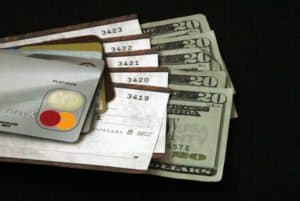Before applying for a business credit card, it's important to know why you want a card, what your credit score is, and what business information you'll need to provide the card issuer.
A business credit card can benefit your business in many ways, from quick access to funds, spending rewards, partner discounts, and other benefits. But how exactly do you get a business credit card?
We’ll explain the whole process of how to apply for a business credit card and give our top tips on how to get approved for a business credit card successfully.
What Qualifications Do You Need To Get A Business Credit Card?
Not every credit card has the same eligibility requirements, but most credit card companies look at a combination of your business credit score, credit history, time in business, and business revenue.
Each card issuer will have different parameters that business owners need to meet to qualify; however, you can expect that the stronger your business credit score and history, the more likely you are to be approved for better rewards and rates.
The 4 Basic Business Credit Card Qualifications
Business Credit Score
Unlike personal credit scores, business credit scores range from 0-100. A score of 50-75 is considered fair, while 75+ is considered a good business credit score.
Credit History
When credit card issuers take about credit history, they measure your credit history primarily based on if you pay your bills on time and if you've had any recent bankruptcies.
Time In Business
Many card issuers take time in business into consideration for approving credit cards. Issuers commonly require 1-2+ years in business, though some may accept less, usually in exchange for high annual revenue or a security deposit.
Business Revenue
Many card issuers also consider monthly or annual revenue when approving credit cards. Revenue requirements vary so widely depending on the issuer that there really is no general range of required revenue.
What Credit Score Do I Need To Get A Business Credit Card?
Business credit cards have no single required credit score. The higher your score, the more likely you are to qualify for better cards with higher rewards rates and more favorable APR terms. A business credit score of 75-80 is considered a good score.
Depending on the credit card, your personal credit score may be considered as well, in which case you’ll want a score of 670+ for a good credit score.
How Long Do I Need To Be In Business To Get A Credit Card?
You can get a credit card with no time in business; however, you’ll likely need to put up a security deposit until your business is established enough for a more favorable unsecured card. Many card issuers require 1-2 years in business for the best rewards rates and APY terms.
How Much Business Revenue Do I Need To Get A Credit Card?
The amount of business revenue required to qualify for a business credit card varies from card issuer to card issuer and will be very dependent on the type of business credit card you’re trying to qualify for. More revenue is always better for accessing high rewards tiers and low APRs, but you may still be able to find good options with lower monthly or annual revenue amounts.
How To Apply For A Business Credit Card
Much more goes into applying for a credit card than just filling out an online credit card application. Learn exactly how to apply for a credit card with these five steps.
Step 1: Check Your Business Credit Score
Before you actually apply for a card, you need to know where your credit stands. You’ll want to check both your business credit score and your personal credit score.
Credit scores are tools that help determine the health of your credit. While they don’t show the complete picture of your credit history, issuers still rely on them when assessing whether you should be trusted with a line of credit. Though you’ll be applying for a business credit card, some issuers will still check your personal credit history when assessing your creditworthiness.
Both major scoring models (VantageScore and FICO) publish scores that range from 300 to 850. In general, an excellent score is 740 or above, good ranges from 640-739, fair from 580-639, and poor is 579 and below. Your score is calculated based on a variety of factors, including payment history, percent of credit used, account lengths, and types of credit. It just so happens that we have a full breakdown of just how long it takes to improve a credit score.
Not sure how to check your credit score? Luckily, it’s free and easy to check your score online. To check your personal credit score online, visit one of the major credit bureaus or a free credit score website. To check your business credit score, you can use the major credit bureau Experian or you can use Dun & Bradstreet.
Step 2: Know How You Will Use Your Business Credit Card
Not all credit cards are created equal, so it’s important to know how you intend to use your card ahead of time in order to choose the best business credit card for you.
Are you planning on carrying a monthly balance? If so, low APR will be an important factor to consider.
Are you just looking to rack up credit card rewards? Some credit cards offer flat-rate cashback, while others offer higher rewards earnings for certain spending categories, like travel or business software. Make sure to pick a card with a rewards structure that matches your business’s spending habits.
Are you looking to make a large one-time purchase or pay down debt? A 0% APR introductory period is going to be key.
Once you’ve narrowed down exactly how you intend to use your business credit card, picking the right one becomes much easier. Which brings us to the next step.
Step 3: Find The Right Credit Card For Your Business
Once you understand your credit and what you need a credit card for, you’ll have a solid foundation for choosing the card for your business.
There are dozens and dozens of business credit card options out there, so to help narrow down your choices, you’ll want to compare:
- Credit card fees
- APR rates
- Rewards rates & redemption options
- Extra features & card perks
- Card eligibility
Our list of the best business credit cards features cards for a variety of business needs and wants to help make the decision process easier.
Curious about what the most common business credit card is? Check out our recent credit card study where we share which major credit card companies issue the most business credit cards.
Step 4: Gather Credit Card Application Documentation
After you’ve decided on a business credit card, you’ll need to gather the required information to apply. As mentioned above, many issuers do consider your personal credit history, so the information you’ll need to gather is both business and personal in nature.
Common information required on a business credit card application may include:
- Business’s legal name, address, and phone number
- Business’s tax identification number or Employer Identification Number (EIN)*
- Type of business and its structure
- Business’s annual revenue
- Business’s estimated monthly spending
- Business’s age
- Role in the business & number of employees
- Personal income
- Name, address, phone number, and date of birth
- Social security number (SSN)
Having this information handy makes filling out your credit card application much easier.
*Although it’s uncommon, you can get some business credit cards with just an EIN and no social security number.
Step 5: Apply For Your Business Credit Card
After you’ve picked out a card and gathered your important information, you’re ready to apply! In most cases, issuers have online applications, but you can often apply via mail or phone and sometimes can even apply in person.
Assuming you’ve already assembled your information, the application process itself should go quickly, as you’ll just be filling out a form with the necessary info. In some cases, you may be approved within seconds of finishing the application. In other cases, you may need to wait a week or so to find out because the issuer will be reviewing your details.
Note that you may need to wait for up to 14 days before you actually receive your card. In some cases, you may be sent a virtual credit card number immediately, which you can then use for online purchases while you wait for your physical card to arrive.
Once you get it in the mail, you’ll be able to activate the card and start using it for purchases.
Our Top Tips For Getting Approved For A Business Credit Card
While there is no foolproof way to ensure you get approved for a business credit card, by carefully considering your credit history and researching a card’s eligibility requirements, you can get a pretty good idea of whether or not you will be approved before you apply.
These tips can also help you improve your chances of your credit card application being approved.
Double-Check Your Eligibility
If you know a card issuer’s eligibility requirements, you can easily see if you qualify for the card before ever completing an application.
Some credit card issuers have great websites that make finding eligibility requirements very easy to find. Others require a little digging. Our credit card reviews can help you understand all of the eligibility requirements for many of the most popular business credit cards. This way, you don’t waste time applying for cards you are ineligible for and can save your effort for cards that match your credit profile.
Be Honest About Your Credit History
Having an objective view of your credit history can help you emotionally detach from the credit card application process and strategically decide on the best card that is in your credit history range.
For example, if you’ve missed bill payments and have a lower credit score, you likely won’t be able to qualify for the lowest APRs or highest rewards earnings until you’ve improved your credit score. Knowing this ahead of time can help you narrow your search to cards you actually qualify for.
Have Realistic Expectations About APR Rates & Rewards
It’s easy to get carried away with looking at the best APRs and best rewards, but many of the best cards require excellent credit. If you don’t have excellent credit, being honest with yourself about what APR rates and rewards you actually qualify for will save you the heartache and frustration of being denied a business credit card.
Pay All Bills On Time
Paying bills on time is one of the best ways to improve your credit score, which is a big factor in many credit card decisions. There are other factors that go into credit scores as well, but this is a great practical tip to help you prove your creditworthiness on a credit card application.
Have A Business Bank Account
Having a business bank account makes it much easier to apply for credit cards because you can quickly show your business’s revenue to a potential card issuer. Some popular business banks also offer business credit cards, so if you already have a good reputation with a bank, you may be more likely to qualify for one of their credit cards.
If you need help finding a business bank account, we’ve compiled a list of the best online banks, several of which also issue business credit cards or corporate cards.
How To Get A Business Credit Card With Bad Card
If you have bad credit or no credit history, you can still get a business credit card — you’ll just be a lot more limited in your choice of credit card and don’t expect much in terms of rewards and features.
Check out the best business credit cards for bad credit or the best business credit cards for no credit history. You’ll find that both lists include several secured credit card options, so don’t be surprised if your low credit score requires a security deposit and/or personal guarantee to qualify.
The good news is that having a business credit card and making regular monthly payments on it can help build your business credit so that you can qualify for cards with more favorable rewards and rates down the road.
How To Get A Business Credit Card As A Startup
Brand new startups with no business history will have trouble getting a business credit card, but if your startup has at least six months to one year of operating history, there are a number of startup-friendly business credit cards you can qualify for.
But what if your startup is brand new and needs a credit card now?
Luckily, you still have some options. You can either go for a secured credit card, or if you have high revenue or investors, you may qualify for a corporate credit card.
Can I Use A Personal Credit Card For My Startup? It is both legal and common to use a personal credit card to fund a business. In fact, a 2017 SBA study found that a higher percentage of startups use personal credit cards to pay for business expenses (13%) than business credit cards (7%).
Though using a personal credit card to cover business expenses is common, you’ll still want to maintain a wall between your business and personal finances by using a separate personal card to fund your business. Our guide to using a personal credit card for business contains other helpful advice should you decide to go this route.
Other Business Credit Card Application FAQs
Can I get a business credit card with just my EIN number?
Certain business credit cards and most corporate credit cards allow you to apply using just your EIN and not your SSN. Options for a business credit card with an EIN only include Chase Ink Business credit cards, most secured business credit cards, and corporate credit cards like Brex.
Do they check your personal credit for a business credit card?
Most business credit card issuers will check your personal credit when you apply for a business credit card. However, there are some secured business credit cards that won’t check your personal credit and many corporate credit cards don’t consider your personal credit at all when assessing your creditworthiness.
Can I use a personal credit card for business expenses?
Yes, you can use a personal credit card to pay for business expenses. Just make sure you don’t mix your personal and business spending on the same card. If you go this route, it’s much easier on you and your accountant to get a separate personal credit card that is entirely devoted to your business expenses.
How quickly can I get a business credit card?
In some instances, if you’re approved for a business credit card from an issuer offering “instant approval,” you may be approved in just a few minutes and sent a virtual credit card number immediately, which you can then use as you wait for your physical card to arrive in the mail. In other cases, it may take two weeks or longer for you to get your business credit card after applying.












